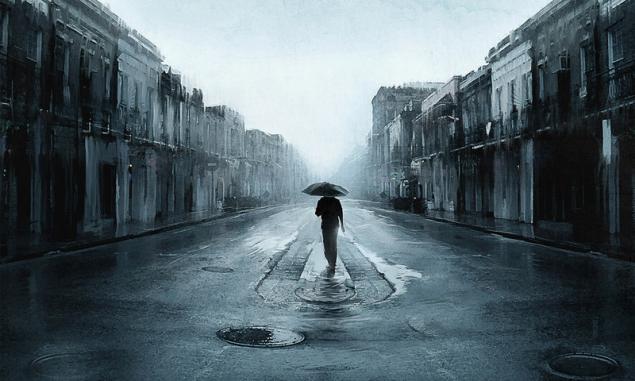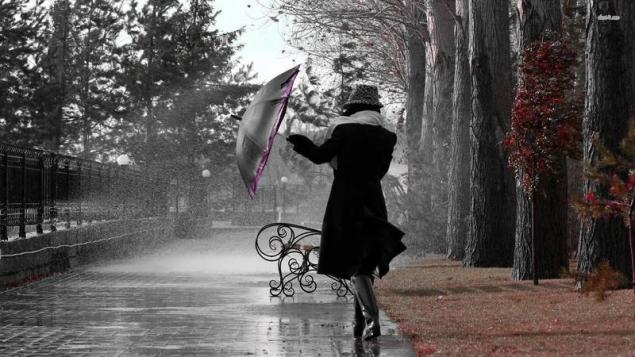266
Life of SOLO: 4 myths about loneliness
We have long been taught that each of us is part of a family, a clan, a collective, that our destiny is to live for others and with others.
But today, the individual life of an individual becomes more valuable. Freedom and personal development are more important than any limitations and even attachments.
Solo life is clearly becoming a trend. This is not a new ideology, this is a new reality.

In the world, more and more people prefer to live on their own, alone, and this trend is impossible to ignore.
Book by American sociologist Eric Kleinenberg Life Solo: A New Social Reality It will probably change the way many of us think about the modern phenomenon of “loners.”
Based on dozens of authoritative studies and hundreds of interviews, Kleinenberg shows that we are less willing to share our home with others. And although there are plans in Russia to enshrine the concept of a “traditional family” almost legally, this ideal has remained in the past in the world.
Today, more than half of Americans live alone, about a third of households are made up of one person in Japan, and the fastest growth in the number of singles is noted in China, India and Brazil. Globally, the number of people living alone increased by a third in the decade from 1996 to 2006. More and more Russians, when they have the opportunity to have their own housing, choose the advantages of free life alone.
As psychotherapist Victor Kagan notes, “We can advocate for traditional family values, but we cannot ignore the changes that are taking place.”
Eric Kleinenberg is trying to understand this. The material he collected and the conclusions he arrives at in The Life of Solo refute the main myths about those who chose loneliness.
Myth number one: We're not adapted to living solo.
This misconception has been true for thousands of years. “He who, by his nature, and not by accident, lives outside the state, is either an underdeveloped being in moral terms, or a superman,” Aristotle wrote, meaning by the state the collective, the community of people.
And this categoricalness is understandable. For centuries, humans were physically and economically unable to survive alone. It may sound cynical, but the sanctity of family and social ties (kin, tribal, whatever) has been driven by survival for centuries.
That is not necessary today. At least in the Western world. “Many wealthy citizens in developed countries use their capital and capabilities precisely to isolate themselves from each other,” Kleinenberg writes. And take it out. There are four main social factors that have led to the current popularity of living alone:
1. Changing the role of women Today she can work and earn on an equal footing with a man and is not obliged to consider family and childbearing as her purpose.
2. The Communication Revolution Telephone, television, and then the Internet make you feel disconnected from the world.
3. Mass urbanization It is much easier to survive alone in the city than in the countryside.
4. Increased life expectancy Many widows and widowers today are in no hurry to enter into a new marriage or move to children and grandchildren, preferring to lead an active independent life.
In other words, the evolution of man and society has overcome many of the negative aspects of living alone. Positive things came to the fore, of which there were many.
“The values of continuing family traditions give way to the values of self-realization,” says Viktor Kagan.
In the conditions of the rapid development of civilization, we can realize ourselves only if we are socially active, professionally mobile, open to change. Humans may not have been created for solitude. But even for communication on the Internet or driving a car, they were not created. But they are doing well (in general). Probably the same thing happens with solo life.

Myth: Living alone means suffering.
Singles are those who live alone, not those who suffer from loneliness., emphasizes Kleinenberg. The caveat is important because the two are synonymous in most languages and cultures – if you live alone, you feel lonely. It is not for nothing that life imprisonment in solitary confinement is considered in many countries a punishment even more severe than the death penalty.
But is everyone so afraid of loneliness?He who is not sufficiently developed as a person, who is not able to enter into a one-on-one relationship with the world, really suffers in solitude.. He loses connections with other people and does not find a worthy interlocutor in himself, says psychologist Dmitry Leontiev. And outstanding people – spiritual teachers, writers and artists, scientists, commanders – very much valued loneliness as the most important resource of creativity and self-development. Apparently, the number of such people is constantly growing. It grows equally among men and women.
True, no historical changes can take away from a woman. motherhood. And so a single woman, approaching the age limit beyond which the birth of a child is no longer possible, can not help but feel anxiety. However, women are less likely to marry just for the sake of becoming a mother.
“My favorite poet, Omar Khayyam, has a famous line: “You’d rather starve than eat anything, and it’s better to be alone than with anyone,” says Evgenia, 38, a chemical engineer. Why should I have to suffer with an unloved person if I live well on my own? For the baby? Are you sure he'll grow up happy in a family where parents don't like each other? It seems to me that in such families people suffer from loneliness, no matter how many people are together under one roof.
This observation almost echoes the thesis of social psychologist John T. Cacioppo: “The feeling of loneliness depends on the quality, not the quantity of social contacts.” What matters here is not the fact that a person lives alone, but whether he feels lonely. Anyone who has divorced their spouse will confirm that there is no life more lonely than living with someone you do not love.”
So the life of a solo is not necessarily a torment, and do not think that the loner is necessarily lonely and unhappy. “One of the manifestations of escaping from loneliness is the steady mass demand for communication trainings,” notes Dmitry Leontiev, not without irony. It seems that training in loneliness, training in the use of loneliness as a resource for development would be much more productive.

Myth Three: Singles are useless to society
Even if we leave aside the legendary hermits and philosophers whose teachings and revelations have become a serious part of the spiritual experience of mankind, this thesis does not stand up to criticism.
The modern urban way of life is largely formed by single people and their needs. Bars and fitness clubs, laundries and food delivery services arose primarily because their services were needed by people living alone. As soon as their number in the city reached a certain “critical mass”, the city, responding to their needs, created all new services that came very handy and family people.
Pavel, 32, is an economist. He does not have a permanent girlfriend, and he does not seek to create a family yet. He lives alone and is very happy with it. “I often have to go on business trips,” he says. - Working late or on weekends. I don’t think it’s going to be good for the family, but I love my job and I feel like I’m becoming a real high-class professional.
Paul does not complain about the lack of communication, he has enough friends. He regularly assists volunteers in the search for missing people and occasionally advises municipal deputies on economic issues. So from the point of view of social involvement, Paul can not be called a “cut-off slice”.
His lifestyle is a confirmation of global statistics, according to which single people are on average twice as likely to go to clubs and bars as those who are married, more likely to eat in restaurants, attend music and art classes and participate in volunteer projects.
“There is every reason to argue,” writes Kleinenberg, “that people living alone compensate for their condition with increased social activity, exceeding the activity of those who live together, and in cities where there are many singles, cultural life is bubbling.”
In short, if someone stimulates the development of society today, it is just a single person.
Myth: We are all afraid of being alone in old age.
Refuting this myth is perhaps one of the most surprising discoveries of The Life of Solo.
As it turns out, older people, who for centuries were attributed to the inability to live alone, are increasingly choosing this kind of life.
“The space of communication has become immeasurably wider than it was even half a century ago, protecting from loneliness, but eliminating the friction of the sides,” explains Victor Kagan. It can even attract older people.
“We are different,” a 65-year-old friend told me, “I need my cup of coffee and pipe in the morning, a piece of meat for lunch, I like a full house of guests and I am indifferent to the order of the house, and she does not digest my pipe, an Orthodox vegetarian and is ready to take the dust off her things all day long, but we love each other – so we began to live in different houses, go to visit each other on weekends or together with children, we travel together and are completely happy.”

But having lost a partner for one reason or another, older people are not in a hurry to acquire a new one or move to grown children. The main reason is the established way of life. It is difficult to “fit” a new person. And it is even more difficult to “fit into” someone else’s house, even if it is a family of their own children. Many older people say that they do not want to witness problems in the families of children or feel a burden for them, and communication with grandchildren out of joy too often turns into a difficult job.
In short, there are many arguments, but the conclusion is the same: old people also want to be alone and increasingly prefer life solo. In 1900, only 10 percent of elderly widows and widowers in the U.S. lived alone, Kleinenberg writes, but by 2000, more than half were living alone (62 percent).
Singles are more active: they often go to clubs and restaurants, attend art and music courses, participate in volunteer projects. Their quality of life is better than many people think.
Back in 1992, older people living alone were more satisfied with life, had more contact with social services, and had no more physical or mental disabilities than their peers who lived with relatives.
In addition, those living alone were healthier than those living with other adults, with the exception of a spouse (and in some cases even those living with a partner). Is it any wonder that older people around the world – from America to Japan, where family values are traditionally strong – are increasingly choosing to live solo, refusing to move to children, much less to nursing homes?
It may not be easy for many of us to accept the idea of the loner era. Both our parents and grandparents professed completely different values, which they passed on to us.
Eugene Delacroix: loneliness is a blessing necessary for development
Why Solitude Chooses the Strongest People
Now we have to make a choice: living with family or one, common plans or personal convenience, tradition or risk?
Freed from myths, we will be able to better understand ourselves and more soberly look at the world where our children will live.
P.S. And remember, just changing our consumption – together we change the world!
Join us on Facebook, VKontakte, Odnoklassniki
Source: vk.com/the_intellectuals?w=wall-43503264_76762
But today, the individual life of an individual becomes more valuable. Freedom and personal development are more important than any limitations and even attachments.
Solo life is clearly becoming a trend. This is not a new ideology, this is a new reality.

In the world, more and more people prefer to live on their own, alone, and this trend is impossible to ignore.
Book by American sociologist Eric Kleinenberg Life Solo: A New Social Reality It will probably change the way many of us think about the modern phenomenon of “loners.”
Based on dozens of authoritative studies and hundreds of interviews, Kleinenberg shows that we are less willing to share our home with others. And although there are plans in Russia to enshrine the concept of a “traditional family” almost legally, this ideal has remained in the past in the world.
Today, more than half of Americans live alone, about a third of households are made up of one person in Japan, and the fastest growth in the number of singles is noted in China, India and Brazil. Globally, the number of people living alone increased by a third in the decade from 1996 to 2006. More and more Russians, when they have the opportunity to have their own housing, choose the advantages of free life alone.
As psychotherapist Victor Kagan notes, “We can advocate for traditional family values, but we cannot ignore the changes that are taking place.”
Eric Kleinenberg is trying to understand this. The material he collected and the conclusions he arrives at in The Life of Solo refute the main myths about those who chose loneliness.
Myth number one: We're not adapted to living solo.
This misconception has been true for thousands of years. “He who, by his nature, and not by accident, lives outside the state, is either an underdeveloped being in moral terms, or a superman,” Aristotle wrote, meaning by the state the collective, the community of people.
And this categoricalness is understandable. For centuries, humans were physically and economically unable to survive alone. It may sound cynical, but the sanctity of family and social ties (kin, tribal, whatever) has been driven by survival for centuries.
That is not necessary today. At least in the Western world. “Many wealthy citizens in developed countries use their capital and capabilities precisely to isolate themselves from each other,” Kleinenberg writes. And take it out. There are four main social factors that have led to the current popularity of living alone:
1. Changing the role of women Today she can work and earn on an equal footing with a man and is not obliged to consider family and childbearing as her purpose.
2. The Communication Revolution Telephone, television, and then the Internet make you feel disconnected from the world.
3. Mass urbanization It is much easier to survive alone in the city than in the countryside.
4. Increased life expectancy Many widows and widowers today are in no hurry to enter into a new marriage or move to children and grandchildren, preferring to lead an active independent life.
In other words, the evolution of man and society has overcome many of the negative aspects of living alone. Positive things came to the fore, of which there were many.
“The values of continuing family traditions give way to the values of self-realization,” says Viktor Kagan.
In the conditions of the rapid development of civilization, we can realize ourselves only if we are socially active, professionally mobile, open to change. Humans may not have been created for solitude. But even for communication on the Internet or driving a car, they were not created. But they are doing well (in general). Probably the same thing happens with solo life.

Myth: Living alone means suffering.
Singles are those who live alone, not those who suffer from loneliness., emphasizes Kleinenberg. The caveat is important because the two are synonymous in most languages and cultures – if you live alone, you feel lonely. It is not for nothing that life imprisonment in solitary confinement is considered in many countries a punishment even more severe than the death penalty.
But is everyone so afraid of loneliness?He who is not sufficiently developed as a person, who is not able to enter into a one-on-one relationship with the world, really suffers in solitude.. He loses connections with other people and does not find a worthy interlocutor in himself, says psychologist Dmitry Leontiev. And outstanding people – spiritual teachers, writers and artists, scientists, commanders – very much valued loneliness as the most important resource of creativity and self-development. Apparently, the number of such people is constantly growing. It grows equally among men and women.
True, no historical changes can take away from a woman. motherhood. And so a single woman, approaching the age limit beyond which the birth of a child is no longer possible, can not help but feel anxiety. However, women are less likely to marry just for the sake of becoming a mother.
“My favorite poet, Omar Khayyam, has a famous line: “You’d rather starve than eat anything, and it’s better to be alone than with anyone,” says Evgenia, 38, a chemical engineer. Why should I have to suffer with an unloved person if I live well on my own? For the baby? Are you sure he'll grow up happy in a family where parents don't like each other? It seems to me that in such families people suffer from loneliness, no matter how many people are together under one roof.
This observation almost echoes the thesis of social psychologist John T. Cacioppo: “The feeling of loneliness depends on the quality, not the quantity of social contacts.” What matters here is not the fact that a person lives alone, but whether he feels lonely. Anyone who has divorced their spouse will confirm that there is no life more lonely than living with someone you do not love.”
So the life of a solo is not necessarily a torment, and do not think that the loner is necessarily lonely and unhappy. “One of the manifestations of escaping from loneliness is the steady mass demand for communication trainings,” notes Dmitry Leontiev, not without irony. It seems that training in loneliness, training in the use of loneliness as a resource for development would be much more productive.

Myth Three: Singles are useless to society
Even if we leave aside the legendary hermits and philosophers whose teachings and revelations have become a serious part of the spiritual experience of mankind, this thesis does not stand up to criticism.
The modern urban way of life is largely formed by single people and their needs. Bars and fitness clubs, laundries and food delivery services arose primarily because their services were needed by people living alone. As soon as their number in the city reached a certain “critical mass”, the city, responding to their needs, created all new services that came very handy and family people.
Pavel, 32, is an economist. He does not have a permanent girlfriend, and he does not seek to create a family yet. He lives alone and is very happy with it. “I often have to go on business trips,” he says. - Working late or on weekends. I don’t think it’s going to be good for the family, but I love my job and I feel like I’m becoming a real high-class professional.
Paul does not complain about the lack of communication, he has enough friends. He regularly assists volunteers in the search for missing people and occasionally advises municipal deputies on economic issues. So from the point of view of social involvement, Paul can not be called a “cut-off slice”.
His lifestyle is a confirmation of global statistics, according to which single people are on average twice as likely to go to clubs and bars as those who are married, more likely to eat in restaurants, attend music and art classes and participate in volunteer projects.
“There is every reason to argue,” writes Kleinenberg, “that people living alone compensate for their condition with increased social activity, exceeding the activity of those who live together, and in cities where there are many singles, cultural life is bubbling.”
In short, if someone stimulates the development of society today, it is just a single person.
Myth: We are all afraid of being alone in old age.
Refuting this myth is perhaps one of the most surprising discoveries of The Life of Solo.
As it turns out, older people, who for centuries were attributed to the inability to live alone, are increasingly choosing this kind of life.
“The space of communication has become immeasurably wider than it was even half a century ago, protecting from loneliness, but eliminating the friction of the sides,” explains Victor Kagan. It can even attract older people.
“We are different,” a 65-year-old friend told me, “I need my cup of coffee and pipe in the morning, a piece of meat for lunch, I like a full house of guests and I am indifferent to the order of the house, and she does not digest my pipe, an Orthodox vegetarian and is ready to take the dust off her things all day long, but we love each other – so we began to live in different houses, go to visit each other on weekends or together with children, we travel together and are completely happy.”

But having lost a partner for one reason or another, older people are not in a hurry to acquire a new one or move to grown children. The main reason is the established way of life. It is difficult to “fit” a new person. And it is even more difficult to “fit into” someone else’s house, even if it is a family of their own children. Many older people say that they do not want to witness problems in the families of children or feel a burden for them, and communication with grandchildren out of joy too often turns into a difficult job.
In short, there are many arguments, but the conclusion is the same: old people also want to be alone and increasingly prefer life solo. In 1900, only 10 percent of elderly widows and widowers in the U.S. lived alone, Kleinenberg writes, but by 2000, more than half were living alone (62 percent).
Singles are more active: they often go to clubs and restaurants, attend art and music courses, participate in volunteer projects. Their quality of life is better than many people think.
Back in 1992, older people living alone were more satisfied with life, had more contact with social services, and had no more physical or mental disabilities than their peers who lived with relatives.
In addition, those living alone were healthier than those living with other adults, with the exception of a spouse (and in some cases even those living with a partner). Is it any wonder that older people around the world – from America to Japan, where family values are traditionally strong – are increasingly choosing to live solo, refusing to move to children, much less to nursing homes?
It may not be easy for many of us to accept the idea of the loner era. Both our parents and grandparents professed completely different values, which they passed on to us.
Eugene Delacroix: loneliness is a blessing necessary for development
Why Solitude Chooses the Strongest People
Now we have to make a choice: living with family or one, common plans or personal convenience, tradition or risk?
Freed from myths, we will be able to better understand ourselves and more soberly look at the world where our children will live.
P.S. And remember, just changing our consumption – together we change the world!
Join us on Facebook, VKontakte, Odnoklassniki
Source: vk.com/the_intellectuals?w=wall-43503264_76762























